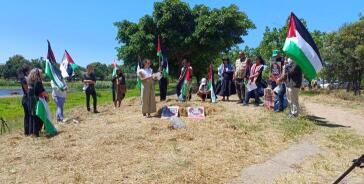As Wednesday marked the International Day of Solidarity with Palestine, Capetonians came out in numbers to various actions, marches, and pickets to stand in solidarity with the people of Palestine.
As Wednesday marked the International Day of Solidarity with Palestine, Capetonians came out in numbers to various actions, marches, and pickets to stand in solidarity with the people of Palestine.
As Wednesday marked the International Day of Solidarity with Palestine, Capetonians came out in numbers to various actions, marches, and pickets to stand in solidarity with the people of Palestine.
Earlier on Wednesday, there was a Cape Town edition of The Gaza Monologues held nearby the Liesbeek River in Observatory.
These Gaza Monologues are testimonies written by ASHTAR youth in 2010, after the first war on the Gaza Strip.
While they were written over a decade ago, the monologues still ring true and remain accurate today.
The accounts highlight the horrors, hopes, and resilience of the courageous Gazan Palestinians, bringing out the voices of children and people in Gaza.
The monologues described how children were subjected to witnessing their family members being killed in front of their eyes, how their dreams are shattered, and how they are facing starvation day by day.
An excerpt from a monologue by Ahmad Taha reads: “I thought the only martyr that would see in the war is the tree. But as soon as I got home, there were four martyrs in our street, as though waiting for me to say goodbye to them. When I was done with that, three more martyrs from the same family in our street arrived… As we buried them and returned, our neighbour’s house, two houses down the street, was bombed by the army, and the house was wiped off the ground. Everyone died. I felt most sad for the little girls.
“In the Shifaa hospital, I saw a sight that I will never forget. Hundreds of corpses, one on top of the other. Their flesh, their blood, and their bones are all melting on each other. You wouldn’t know the woman from the man or even the child. Piles of flesh on the beds, and lots of people screaming and crying, not knowing where their kids are, their men or their women.“
The Palestine Solidarity Campaign said it’s imperative that we, as South Africans, speak up.
“As a country and as a city still suffering from the legacy of apartheid, which was buoyed by support from the likes of Israel and its strongest ally, the United States, we recognise our political, moral, and, most importantly, human responsibility to stand in solidarity with Palestine and with oppressed people everywhere. Our struggles are entirely interconnected and interdependent,” said the Palestine Solidarity Campaign in a statement.
To symbolise the lasting resilience of the Palestinian people and their commitment to peace, an olive tree was planted near the Liesbeek River. Convenor of Save Our Sacred Lands Tauriq Jenkins said: “The reason why we planted the olive tree was to symbolise lasting resilience and commitment to long-lasting peace. We planted the tree at this particular site because this site is the site of the first dispossession in our country. It is a very important site for the San and Khoi. It is the epicentre of our liberation and resistance. It’s where the Dutch Khoi War broke out in the 1600s and where the land was stolen for the first time by the Dutch East India Company. As South Africans and indigenous people, we can relate to these monologues, whether they were written in 2010 or 2014.”
In attendance were Save Our Sacred Lands, Artists Against Apartheid, and Jews for Free Palestine, all of whom were involved in this movement.
More demonstrations and actions in the Mother City include, but are not limited to: a demonstration at Modderdam High School; a healthcare workers Solidarity protest; Solidarity Action in Blikkiesdorp; pickets calling for the genocide to stop in Maitland and Salt River; solidarity protests in Manenberg and Turfhall Road; a picket in Highlands Drive; a march in Khayelitsha; and an International Day of Solidarity in Worcester.
IOL

